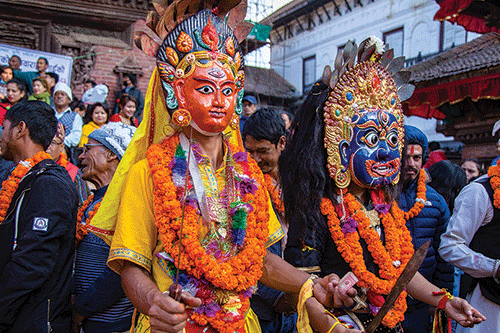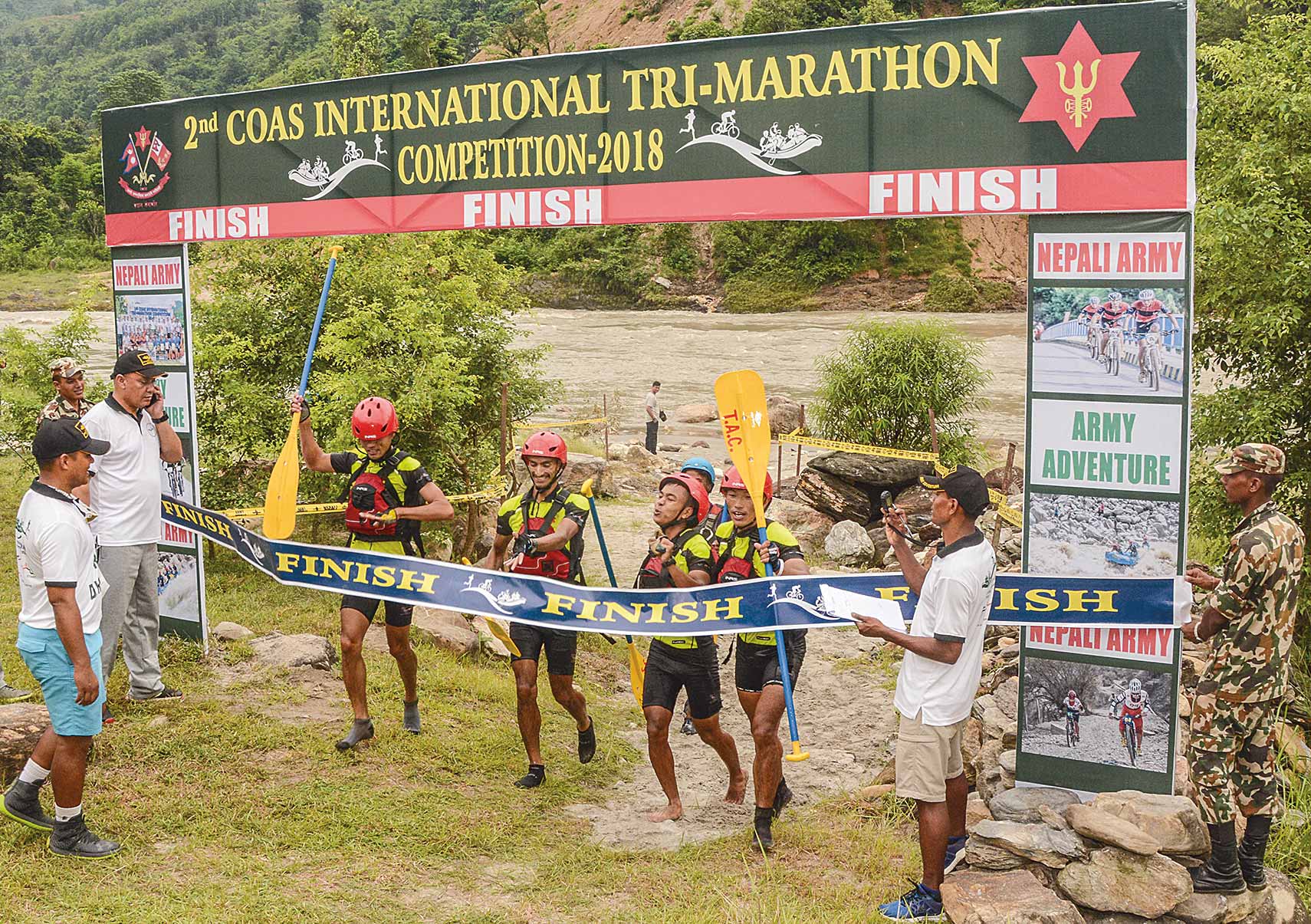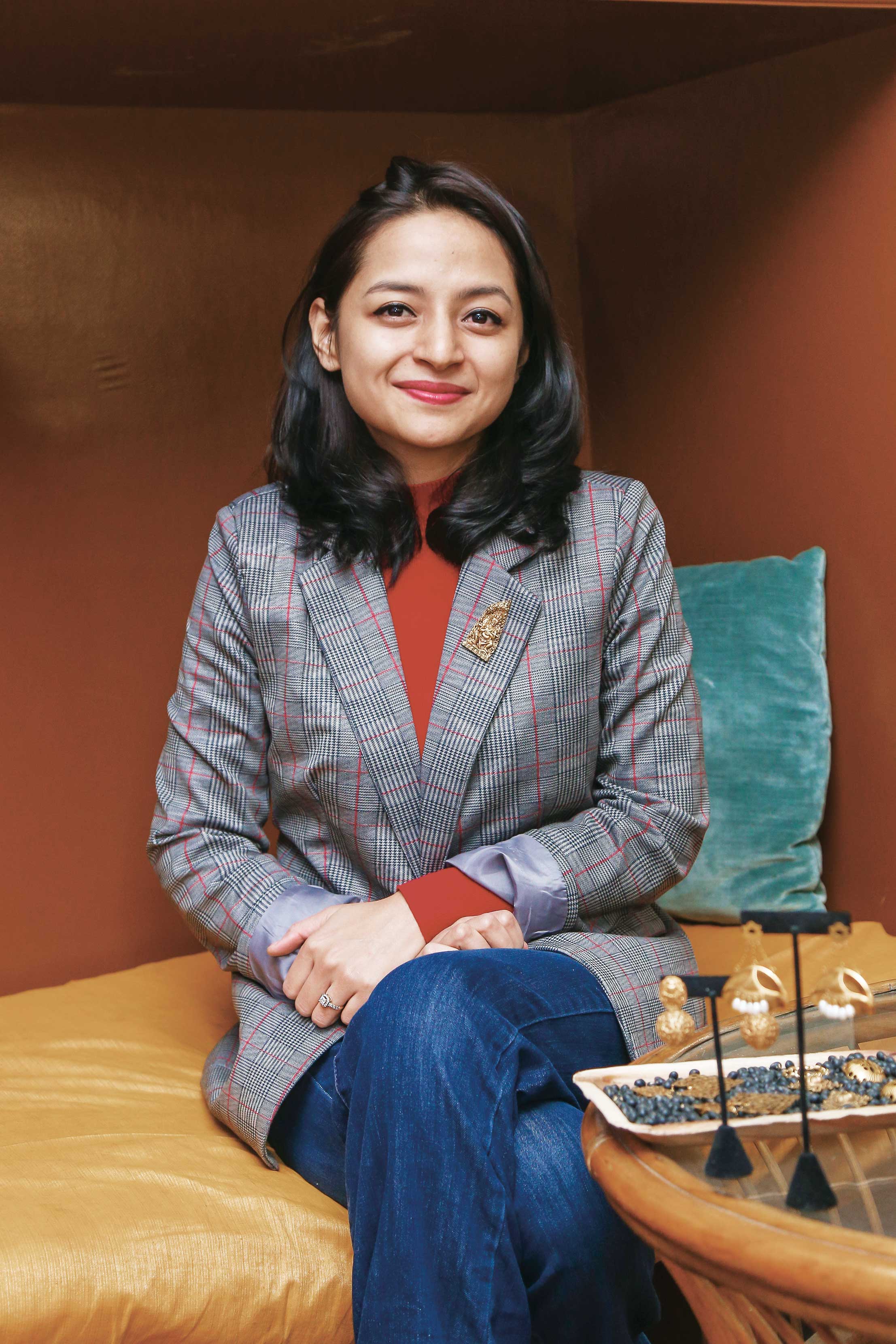From the time we are born, our lives are dominated and guided by gurus. Our first gurus in this world are of course our parents, who teach us everything from how to eat, how to walk, how to talk and when we grow up, how to behave; thus shaping our future. Then there are our other gurus; our teachers and professors in school and college who guide us through their teachings. Some time or the other during our lives, we will also meet games masters, music teachers, karate instructors, the list is long. Here are some gurus who are making a difference in the lives of their pupils, by passing on what they learned the hard way. They are the unsung heroes who have the power to change lives.
Sharad Lama: Tennis Coach
Sharad Lama, ace player and veteran coach has plenty to be happy about. He has had the privilege to train the national tennis squads of the Maldives (In 1991, for Colombo SAF Games) and the Nepali national team. He has the distinction of being the first Nepali coach to be registered with USPTR (United States Professional Tennis Registry) and also the only Nepali to face the former tennis World No. 1 Björn Borg in the courts at Dashrath stadium in 1982. His list of successes is long and he was also Nepal No. 1 on many occasions.
His feats are remarkable considering the fact that he took up the game quite late in life. “I was around 17 when I decided to pursue the sport. My love for the game is thanks to my father who fostered it into my heart,” reveals Lama. Since then, there has been no looking back. In both the singles and the doubles categories, he has ruled as the supreme champion. In 1977, he became the national champion and repeated the feat in 1981 and the following year in 1982. With his doubles partners, Raj Lama and S K Singh, he ruled the doubles courts for decades, a rare feat even today.
After a lifetime of adventures on the clay courts (He was the first clay court champion in Nepal), he turned to coaching. He has helped shape the future of many young talents. “Nowadays, I am training junior players and am about to restart the School Tennis Initiative program where we will introduce tennis to school students,” informs Lama. The School Tennis Initiative was started to introduce tennis to kids aged 7 through 11. Before it was scrapped, the program had reached a total of 40,000 kids across the country. To honor his involvement in tennis and to salute his exemplary work, the International Tennis Federation honored him with the School Tennis Coordinator Award in 2000. Rest assured the future of Nepali tennis is in able hands.
Contact no.: 98510-47321
Shree Ram Magar: Tennis Coach
Shree Ram Magar fell in love with the game of tennis at an early age. As a boy watching others playing tennis at the Dashrath Stadium, he was immediately attracted to the sport. He started as a ball-boy on the court, and occasionally grabbed the opportunity to try his hand at a game when there were no clients around. “I started as a ball-boy and slowly learnt how to play the game by watching and practicing. I’d practice for endless hours trying to improve my game,” Magar reminisces.
“He’s an excellent player and has been the No. 1 national player many times,” shares Sharad Lama, former No. 1 and veteran coach, “It’s really commendable how he has managed to come a long way from such humble beginnings.” Now, on the last count, he’s been playing professionally for the last two decades occasionally occupying the No. 1 spot. For just as long, he has been teaching the young ones to hone their skills in tennis. His long career has also seen him participate in international tournaments and win accolades in both national and international circuits. “My most memorable games have to be in the Pakistan Open, where we had progressed to the quarter final of the tournament,” reveals Magar.
Lately Magar has taken to coaching budding talents in the National Tennis Academy and can be seen teaching his apprentices to serve up that perfect ace, volley and the works. He is regularly seen at the Satbobato sports complex, teaching the many techniques involved in playing tennis alongside other coaches like Sharad Lama.
Contact no.: 980328454
Rabin Lal Shrestha: Tabla Master
Rabin Lal Shrestha grew up listening to bhajans sung by his father and soon enough, he too was singing them. The bhajans were accompanied by the tabla and his interest in the instrument slowly grew over the years. By the time he reached the age of ten, he was already learning how to play it.
Born in Kathmandu, Shrestha started taking lessons from Sadhuram Manandhar and went on to learn from Ganesh Raj Wonta, Nara Raj Dhakal and the famous Homnath Upadhyaya. He also took lessons from another guru, Sambhu Prasad Misra. Today Rabin Lal himself is a guru, teaching his pupils at the Lalit Kala Campus, Bhotahiti, where he began giving lessons in 1989. He came to Lalit Kala Campus with a three year teaching experience from the Holy Garden School.
Shrestha’s classes are held six days a week at the Campus. “There are about twenty regular students, but actually fifty are registered. Each period is fifty minutes long and students have to attend a minimum of three periods,” informs Shrestha. The courses at the campus include an Intermediate course of two years followed by a Diploma course of three years. “At present there are three of us teaching the tabla here,” adds Shrestha. Besides teaching, Rabin Lal performs regularly every Friday at Hotel Vajra along with Suresh Raj Bajracharya on sarod and Prabhu Raj Dhakal on vocals. They have been performing for over two years and the show is entitled “Dafa”. In 1991, Rabin Lal went on a European tour with sitarist Tarabir and toured France a few years ago with another well-known sitarist, Bijaya Vaidya. But his long term plans of touring had to be abandoned because of his teaching obligations back home in Kathmandu.
Rabin Lal has two albums to his name. The first was a solo album entitled “Tabla Solo” that came with the book “Dafa” also written by him. He followed it up with the recently released “Grand Rehearsal” with Suresh Raj Bajracharya on sarod. When asked if classical music has a future, Shrestha replies, “There is a lot of enthusiasm among the younger generation.”
Contact: 98510 51551
Phiroj Shyangden: Guitar Teacher
Phiroj Shyangen needs no introduction. As singer/guitarist and founding member of the most popular Nepali rock band, 1974 AD, he has performed and toured extensively. Besides playing concerts with his band, Phiroj has contributed much to music in Nepal by passing on his skills to young aspiring musicians whom he teaches at schools, and also in his own music school “Musical Spectrum” opposite the Lalitpur Fire Brigade in Pulchowk. He also continues to teach at Gyanodaya School.
At the age of fourteen, Phiroj started to learn to play the guitar, which by then was becoming quite a craze in his hometown. When he reached twenty, he began formal lessons with the musical genius of Darjeeling, Jiwan Pradhan. From his first guru, he learnt classical guitar and the blues after which he embarked on his musical journey, learning as he went along from contemporaries and even the internet.
Shyangden formed his first band called “Dreamers” before he moved to Kathmandu and began teaching in various schools. He reminisces, “I owe it to Dibya Khaling for where I am today. He was the one who introduced me to Nirakar Yakthumba (Band leader of 1974 AD). I began teaching in Nirakar’s school and we used to jam a lot ever since we met. We finally formed the band with Bhanu A and Patrick Wilson. The two left the band, but we carried on with new members and the rest is history.” The band has toured the US twice and UK once, besides Australia, South Korea, Hong Kong, Doha, Shillong, Delhi and Mumbai. “It was Sonny Shrestha of Hits FM who advised us to record Nepali songs and that was what really launched 1974 AD. Otherwise we were just playing English covers,” admits Shyangden. The band has released seven albums to date and now Phiroj has come up with his first solo ablum “Phiroj Shyangden”. He is presently busy with the music videos to his songs.
In 1990, Phiroj began teaching the guitar to students and then went on to establish ‘Musical Spectrum’ with another guitar teacher, Suresh Mukhia. At the institute, Phiroj has been teaching six days a week and allocates one hour for each student. “Once students have passed the basic course, they spend more time practicing. I have to give more time to those doing the basic course,” says Phiroj. As expected, most of the students are boys and when asked about their consistency, he answers, “There are those who leave after one or two months and you can tell beforehand, which ones will. There are others who have been with us since the beginning, and we know they are serious about learning and will not leave any time soon.”
Contact: 5529798
Birendra Bikram Shah: Cricket Coach
One of the coaches at Shangri-la Cricket Academy (SCA), Birendra Shah also teaches cricket at the Little Angels School. He is one of the few cricketers in Nepal who has an academic background. A product of Priyadarshani Cricket Academy of Asansol, he played his first season there and moved on to the sub-division level league matches. He finally played in the Super division for Young Men’s Cricket Club (YMCC).
Shah arrived in Nepal and played for the Baneshwor Height Cricket Club in the Mahabhir Cup. Then in 1999, he was selected for the Under-19 Nepali national team and played in the Youth Asia Cup (World Cup qualification) where they reached the finals. He was also a very important member of the U-19 team as opening batsman. The team qualified for the World Cup that was held in Sri Lanka. It was the first batch to play in a world cup and his most important innings came when playing against England.
In 2001, Birendra qualified for the senior team to play the ICC Trophy in Toronto, Canada. After 2002, his interest began to shift towards coaching. So, he began his coaching career with South Point Boarding School and also taught at the Buddha School. Some of the other schools he has taught at are Little Angels, Gems and United School to name a few. Today, Birendra Bikram is a director and a coach at the Shangri-la Cricket Academy.
Birendra Shah has been coaching the U-15, U-17 and U-19 Nepali players, and three of his students from SCA who are also students of Little Angels, are representing Nepal in the U-15 squad. Birendra was also recently awarded the Best Bowler trophy at the Kathmandu Regional Selection tournament. With his kind of experience, there is much the younger generation can learn from him.
Contact: 9841 230922
Pushpa Shrestha: Art and Craft Teacher
Her instructions are clear, “Don’t walk blindly, observe nature, the dimensions of leaves and flowers vary from one tree to the next; notice the different colors of nature and finally doodle on the paper with your thoughts.” Pushpa Shrestha, Head of the Art and Craft department at Shuvatara School defines and puts life into her subject; “art”. Born in Chainpur, eastern Nepal’s repository of natural beauty, she looks back today to thirty two years into this profession and finds herself still learning and drawing inspiration from her profoundly talented mother.
While pursuing her home-science degree at Padmakanya College, realization dawned on her that art was her passion. She also realized later, that the skill had to be passed on, and so, she began her teaching career at Marigold school, Dharan in 1975. After four years of teaching, she quit and devoted her time to her husband and two children. But you cannot turn away from what you’re passionate about. After a hiatus of fourteen years, she finally joined Shuvatara School in 1993, still passionate, enthusiastic and eager to teach art once again.
‘Pushpa Miss’ as she is known in school, feels that art relaxes and soothes the mind through the very aesthetic creation of one’s imagination. Shrestha strongly believes that if skills like crafting, origami, paper foldingand tie and dye are taught to housewives it would nurture their skills and also help them earn a decent income. She has attended various programs to display her skills with the hope that she may inspire others. Her uniqueness is her strong belief in recycling. “Everything that can be recycled, should be recycled,” she insists. She transforms nut shells, cake holders, newspapers, leaves and invitation cards into beautiful creations.
After a conversation with Pushpa Miss, one feels nostalgic, as memories of school days creep in. One cannot help but feel glad that there are dedicated teachers like her, who teach future generations the value of art and aesthetics.
Gopal Shrestha: Wushu coach
When we were kids, the lightning quick movements of the legendary Bruce Lee inspired us all. However, unlike most of us, Gopal Shrestha popularly known to all as 'Jack Guru', found the motivation to pursue martial arts and learnt Wushu at an early age. "Wushu is the most popular national sport in China, and is practiced by people of all ages. Wushu involves soft hand exercise, use of knives, swords and bamboo and strenuous body movement like punching, kickboxing and wrestling as well. It has many health benefits like the reduction of asthma, nerve problems, muscular pain, etc. which adds to its popularity," explains Jack Born in Mahankal, Boudha, Gopal started learning Wushu at the age of fifteen in 1987. He then became a regular student of Chief coach Pranil Dhoj Karki at the Dashrath Stadium."There are Wushu centers in more than 30 districts in the country, but only about 24 coaches," says Shrestha. So, he trained under a Chinese coach for two years and started coaching in 1989. Since then he has trained people in countries like Sri lanka, China, Malaysia, Bangladesh to name a few. Every morning Jack Guru starts his day at the Stadium, giving training from 6:30 to 8:30 am and fills his day with Wushu as he visits various sports clubs, arranges special classes for Nepali actors, provides training at Gurukul and still manages to think about the development of the game in our country.
He teaches national level students preparing for national and international events. It has been about 24 yrs since his involvement in the sport but he is still not content. "Teaching the sport is not enough," he claims, "Aspiring students in other districts have to walk 2 hrs to reach a Wushu Center and do not have the necessary equipment, mats, proper diet guidance and plan," he laments. But an optimist like him is what a country needs. Sitting inside the Covered Hall of Dashrath Stadium, he reveals his interest in establishing a Wushu Research Center in Nepal where national as well as international players can come for training. The Olympic Committee has adopted "Vision 2020", a program for which a special budget has been allocated. Jack Guru feels that a lot of effort is being put in regionally, nationally and to prepare the athletes for international level games (SAF, Asian Games and Olympics). Currently he is involved in turning the vision into a reality.
Contact: 9841 240756










